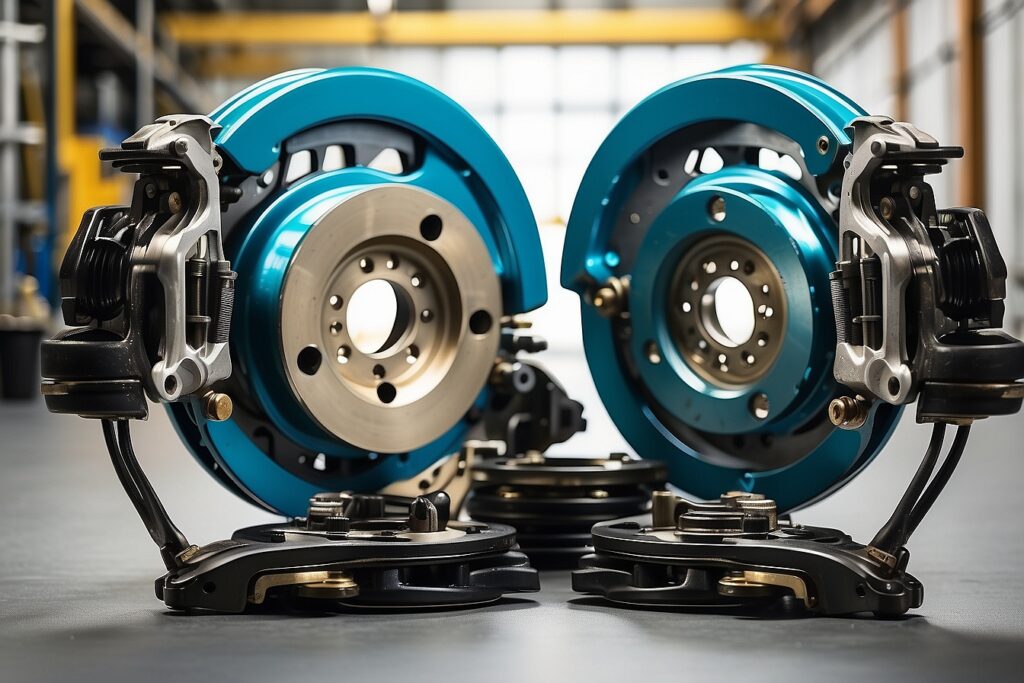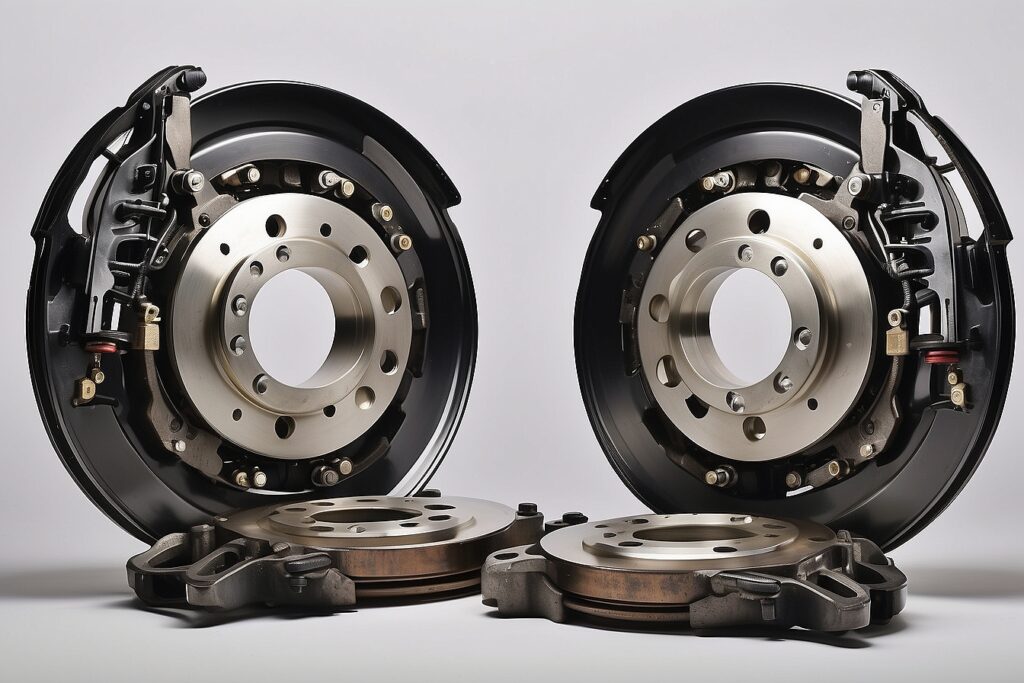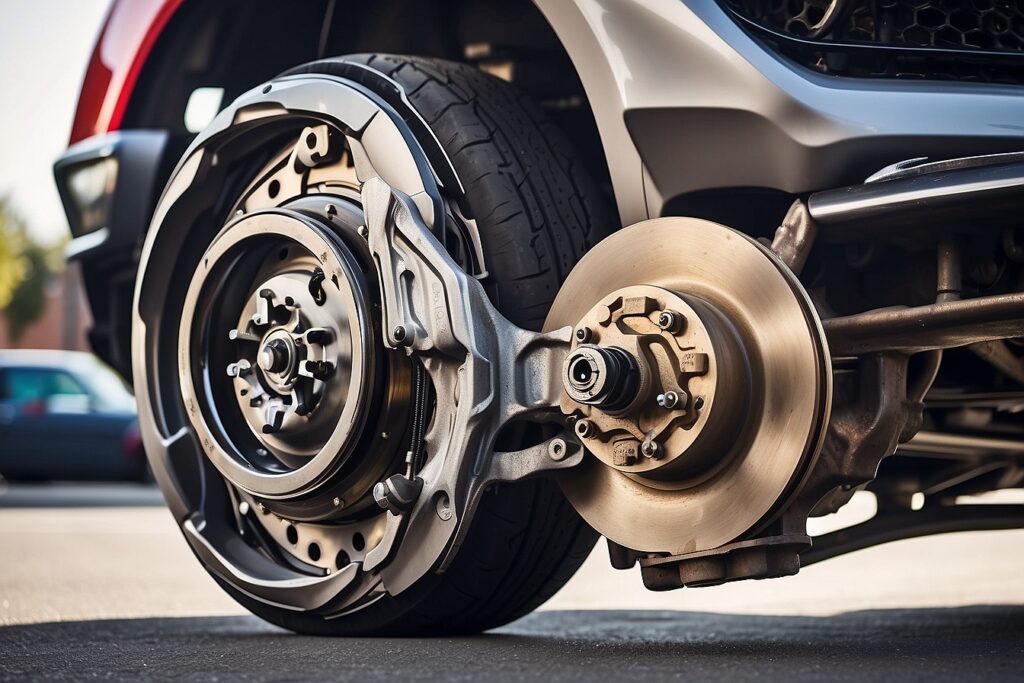Drum Brakes VS Disc Brakes: Which Is Better
For decades, drum brakes have been the standard in the automotive industry. However, with advancements in technology, disc brakes have become increasingly popular. Both have advantages and disadvantages, making a choice between the two more complex than ever. Understanding the differences between drum and disc brakes is crucial in order to make an informed decision for your vehicle.
In this article, we will explore the pros and cons of each type to help you decide which brake system is better for your needs. Whether you’re a car enthusiast or a regular driver, you’ll want to consider all the factors before choosing. Let’s dive in.
Table of Contents
What Is a Simple Brake System
A simple brake system is a fundamental component of any vehicle and consists of a few basic parts. The primary parts of a simple brake system include the brake pedal, brake lines, brake calipers, and brake pads. When the driver presses the brake pedal, it activates the brake booster, which increases the force applied to the brake lines. The brake lines then transmit this force to the brake calipers, which clamp down on the brake pads.
The friction between the brake pads and the rotors slows down the rotation of the wheels, eventually bringing the vehicle to a stop. While simple brake systems are effective at slowing and stopping the vehicle, they do not offer the advanced features found in more complex brake systems, such as anti-lock braking and electronic stability control. However, simple brake systems are reliable and easy to maintain, making them suitable for many vehicles.

Braking System Basics
The braking system of a vehicle is a crucial component for ensuring safety and control. The system works by converting the kinetic energy of the moving vehicle into heat energy through friction, ultimately slowing down or stopping the vehicle. The basic components of a typical braking system include a brake pedal, brake booster, master cylinder, brake lines, brake calipers, brake pads, and brake rotors.
When the driver presses the brake pedal, it activates the master cylinder, which in turn applies hydraulic pressure to the brake calipers. The calipers then squeeze the brake pads against the rotating brake rotors, creating friction and decelerating the vehicle.
The efficiency of the braking system depends on the condition of these components, as well as the type of brake system – whether it’s conventional hydraulic brakes, anti-lock braking system (ABS), or electronic stability control (ESC). Regular maintenance and inspections are essential for ensuring the reliability and proper functioning of the braking system, as well as for preventing potential safety hazards on the road.
Basics of Disc Brakes
Disc brakes are a common type of braking system found on most modern vehicles. They work by using calipers to press brake pads against a rotor, which creates friction and slows down the vehicle. The main components of a disc brake system include the brake pads, calipers, and rotors. When the brake pedal is pressed, hydraulic fluid is used to force the calipers to squeeze the brake pads against the rotor, creating the friction needed to stop the vehicle. Disc brakes are known for their consistent and reliable performance, even in wet conditions.
They are also easier to maintain and offer better heat dissipation compared to drum brakes. Additionally, disc brakes are more responsive, providing better-stopping power and control. Overall, disc brakes are an essential safety feature on vehicles, and understanding their basics can provide valuable insight into maintaining and servicing them.
What Does Actually Drum Brakes Mean?
A drum brake is an older automotive brake system with a drum design on all four wheels. All the drum brake parts are enclosed within a single drum, which rotates along the wheel. The main components of a drum brake include the brake shoe, wheel cylinder, pistons, and springs, which are held in place by the backplate.
The basic principle of working for a drum brake is when you press down on the brake lever; it pushes against a wheel cylinder to force hydraulic fluid through to push pistons outwards. This expands and causes the inner lips of two anti-friction brake shoes to come towards each other and bear against the inside walls of the rotating wheel hub, consequently generating friction which brings about slowing down or stopping motion.
The springs then supplement this process by pulling or pushing back upon their respective shoe holders, ensuring no excessive pressure builds up and causes the brakes to rattle or heat up too much.

Pros
The components involved in drum brakes are fairly clean and easy, which helps keep the overall cost of the car low. While these brakes may not be as efficient as some other brake systems, they require much less pressure to use, making them a good choice for some applications.
Another advantage is their ability to accommodate the parking brake easily. This can be done without taking up any extra space in most cases.
Additionally, when it comes time for maintenance or repairs, drum brakes are simpler to work with than disc brakes – the wheel cylinder is much easier to recondition than its counterpart on a disc brake system.
All in all, drum brakes have several upsides that make them an ideal choice for situations where cost and efficiency are important. Their reliable braking performance and ease of repair make them an attractive option for those looking for a straightforward and affordable brake solution for their vehicle.
Cons
The biggest issue with drum brakes is their terrible heat dissipation. When this problem occurs, the heat causes slight expansion of the metallic parts and can lead to serious issues like overheating. It also reduces piston performance by collecting unwanted materials that may cause rusting. This is a major problem as it directly affects the vehicle’s braking power.
In addition, due to the high amount of heat generated, these brakes wear out quite fast and hence require frequent maintenance. With so many parts involved in drum brakes, there is also an increased chance of failure compared to other brake types, such as disc brakes.
Furthermore, because of all these issues related to heat, these drums don’t last long, and replacing them is often an expensive and time-consuming hassle.
What Does Actually Disc Brakes Mean?
Disc brakes are a type of braking system that is found in most modern vehicles. They use an arrangement of rotors and calipers to add friction to the wheels and slow down the vehicle. The main components are the disc or rotor, caliper, and brake pads, which provide an incredibly effective braking system when combined.
When activated, the disc rotors are mounted on the wheel hub and will force the caliper pistons to press against the two brake pads that clamp together on either side of the unit, creating friction with a spinning metal disc.
This causes increased levels of resistance to be placed upon the axle, thus slowing down or stopping it completely depending on how hard they are pressed. Ultimately this increases safety for both passengers and drivers alike.

Pros
Disc brakes provide better performance in wet conditions due to their ability to repel water from the rotor and wipe it away with the brake pads, giving them an advantage over drum brakes. Disc brakes offer a more straightforward and consistent performance in comparison to drum brakes, resulting in a decreased chance of locking up during forceful braking.
Cons
Furthermore, since disc brakes offer greater stopping power than drum brakes, they require higher energy input and produce more heat during operation. This increased heat can lead to warping and other problems if the brakes aren’t properly cooled while in use.
Additionally, disc brakes require significantly more maintenance than drum brakes due to their complexity – regular inspections and servicing of calipers, rotors, and pistons are essential for the optimal functioning of these sorts of brakes.
Despite their superior overall performance relative to drum brakes, disc brakes often do not make sense from an economic standpoint due to their cost implications and levels of necessary care.
Drum Brakes vs Disc Brakes: Which is Better?
Disc brakes have been widely recognized for their superior ability to provide better braking performance compared to drum brakes. This is why many modern cars come with disc brakes at the front wheels and drum brakes at the rear.
This combination works well because most of a car’s braking power comes from its front; disc brakes provide sufficient stopping power here, while drum brakes suffice for the rear. Discs offer superior heat dissipation, a better brake feel, and easier maintenance, which are all beneficial factors for vehicle safety.
On the other hand, drum brakes are more space efficient due to their internal mechanism, making them an ideal choice where space is limited, such as in rear-wheel-drive vehicles or compact vehicles.
Drum brakes offer good value for money and suffer minimal fade under heavy use since they require less energy to actuate than disc brakes. Overall, each brake has its own drawbacks and advantages, so combining both offers an ideal braking setup that maximizes your car’s performance in terms of both handling and sharp road turns, as well as comfortable highway rides.
Frequently Asked Questions [FAQs]
1. How Long Do Drum Brakes Last?
Drum brakes are a type of brake system that uses two curved plates, called shoes, to press against the inside of a spinning drum. This friction slows the vehicle down. Drum brakes were once the most common type of brake system used in cars and trucks, but they have since been replaced by disc brakes as technology has improved.
2. Are Disc Brakes Better Than Drum Brakes?
Disc brakes are generally regarded as the superior braking system when compared to their drum brake counterparts. This is due to a number of reasons, including their increased effectiveness in wet conditions, decreased chance of locking up during forceful braking, and their ability to dissipate heat more effectively. Additionally, they require less energy input to actuate than drum brakes and often offer a much smoother brake feel.
3. Do Disc Brakes Last Longer?
The longevity of disc brakes depends on several factors, including the type of vehicle, driving habits, and maintenance. Generally speaking, disc brakes tend to last longer than drum brakes because they are more robust and resistant to wear and tear. Disc brakes also respond better in wet conditions due to their increased friction surface area.
4. Do Disc Brakes Stop Faster?
When it comes to stopping power, disc brakes are generally considered to be superior to drum brakes. Disc brakes provide more consistent and reliable braking performance and better heat dissipation, which helps prevent brake fade. While both brakes will cause a vehicle to stop, disc brakes are often considered better for stopping quickly and abruptly in emergencies. This is because of the brake pads on the disc brakes.
5. What Brakes Do Most Cars Use?
Hydraulic brakes are widely used in modern cars to stop moving wheels using hydraulic pressure. The system consists of two fluid-filled pistons and springs, with the ‘master’ piston containing most of the fluid and a pushing object.
Conclusion
Disc brakes are widely regarded as the superior braking system compared to drum brakes. Disc brakes provide better braking performance, improved heat dissipation, and easier maintenance. However, drum brakes offer good value for money and space efficiency in compact vehicles. Ultimately, combining both of them offers an ideal braking setup that maximizes your car’s safety and performance.
